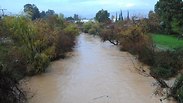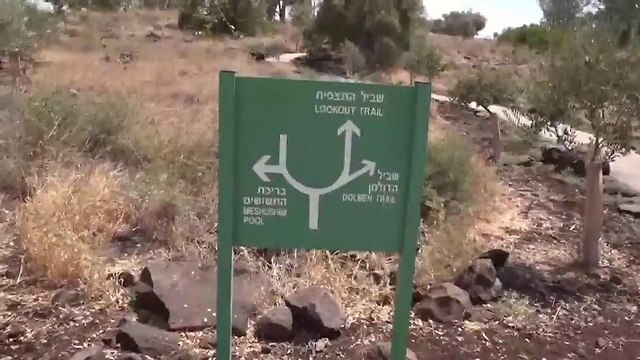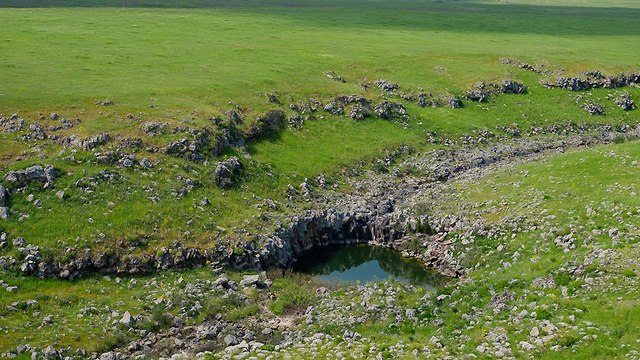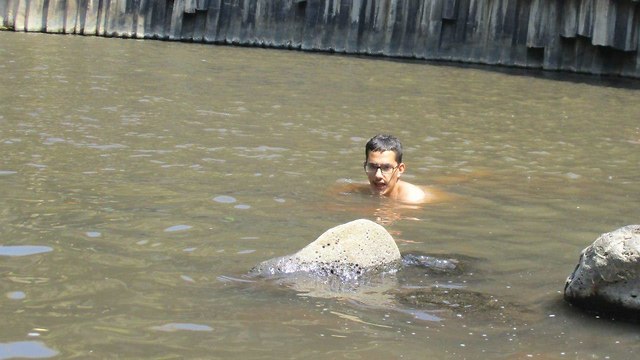

Health Ministry finds high levels of pollution in 3 Golan streams
32 Israelis contract leptospirosis after swimming in streams in the Golan Heights; ministry finds high levels of fecal E. coli bacteria in Zaki, Mesushim and Yehudiya streams, barring the public from entering them as well as several other bodies of water.
The Health Ministry found high levels of fecal E. coli bacteria in several streams in the Golan Heights, it said Thursday, after 32 Israelis had contracted leptospirosis while swimming there.
Although the standard pollution levels for bathing or swimming stands at 400, samples show the pollution levels at the Zaki stream are at 4,400—11 times higher than permitted—while the Mesushim and Yehudiya streams' levels are three times higher.
The ministry listed several streams the public is not allowed to enter: Zaki, Yehudiya, Meshushim, Zavitan, Jilabun, and Daliyot (at the Majrassa Nature Reserve), as well as the Jordan River (only in the Jordan Park area). All other bodies of water in northern Israel are safe to bathe in.
"We are monitoring the situation closely and report back to the public on a regular basis," said Health Ministry Director General Moshe Bar Siman-Tov.
He warned against "fake news posted on social media" and urged Israelis to adhere only to official statements.
The Nature and Parks Authority, together with the Water Authority, the Mekorot Water Company, and the Mei Golan Water Association, will introduce clean water to several streams immediately after the High Holy Days to increase the flow and reduce pollutant concentrations.
Meanwhile, a 17-year-old boy suffering from meningitis was hospitalized at the Mayanei Hayeshua Medical Center in Bnei Brak with on Thursday complications caused by leptospirosis after bathing in one of the polluted streams in the Golan Heights. His condition is stable and his life is in no longer at risk.
"There are currently seven children and teenagers aged 11 to 17 hospitalized in the Pediatric Department with symptoms suspected to be caused by leptospirosis after they visited the sites mentioned in the Ministry of Health's announcement," said department head Prof. Eli Somekh.
On Wednesday, five students aged 14-17 were hospitalized on suspicion they caught leptospirosis during a trip to the Jordan River, with concerns other students may have also been afflicted.
Prof. Michal Hovers, who runs the infectious diseases unit in Meir Hospital in Kfar Saba, explained how Leptospirosis infects the streams and described its main symptoms.
"Animals infected the waters and streams, and people who either bathe there or come into contact with mice urine in outdoor habitats can catch this infection," she said in an interview with Ynet.
"Symptoms can be mild in some cases but in others the infection can become severe and lead to kidney and liver failure,” she continued.
Prof. Hovers added that symptoms include fever, flu-like symptoms and sometimes corneal infections but emphasized that not all symptoms require admission to hospital.
“Mild cases can heal without intervention, and thus not everyone who bathed in the streams and who has a fever has to rush to the hospital," she noted.
"However, if high temperatures persist and someone doesn't feel well, it is better to go and get a blood test in order to ensure that liver and kidney functions are in order, and take antibiotics if needed,” she explained.


















